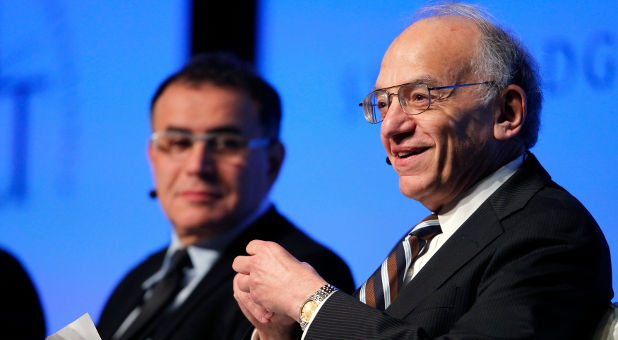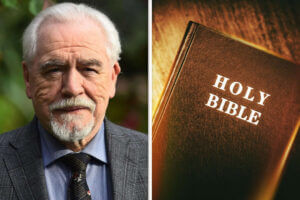There are countless thousands of investing books out there, but precious few that could be considered true classics.
Some of the obvious titles include Benjamin Graham’s The Intelligent Investor, of course, one of the bibles of value investing and a favorite of gurus like Berkshire Hathaway’s Warren Buffett. Maybe books like Burton Malkiel’s A Random Walk Down Wall Street, or Beating the Street by former Fidelity Magellan manager Peter Lynch should also be included on the syllabus.
But no such list would ever be complete without Stocks for the Long Run, by Jeremy Siegel, a finance professor at the Wharton School of the University of Pennsylvania.
Hard to believe, but 20 years have passed since that classic’s first publication back in 1994. Now there is a new edition of the book, analyzing the 2008 financial crisis that shook investors to their core, and providing fresh forecasts for the years ahead.
Reuters sat down with Siegel to chat about the wild ride of the last two decades—and about what twists and turns are still in store.
Q: Twenty years have passed since you published your book, but long-term stock returns have remained the same. Do you see those findings as a validation of your earlier work?
A: Stock returns through 2013 have averaged 6.7 percent per year, which is exactly the same as I reported in the first edition of Stocks for the Long Run back in 1994. Of course there has been quite a bit of volatility over the past couple of decades.
And over the short run, equities are indeed a very volatile asset class. But over the long run, perhaps the most stable asset class of all, delivering the highest returns.
Q: You are not quite as hopeful for bondholders, though.
A: They have had some great years, but right now it looks to me like the environment of the early 1960s. I don’t think we will end up with inflation rates like we had in the 1970s, which got up into the double digits, but I do think 10-year interest rates on bonds will get to 4 or 5 percent. Not this year, maybe, but in 2015 or 2016. And that obviously does mean a tougher time for bondholders ahead.
Q: Your new edition analyzes the roots of the financial crisis of 2008-9. What is your take?
A: I don’t blame (former Federal Reserve chairman) Alan Greenspan for keeping interest rates low. I don’t think that is relevant. But I do blame him for not seeing the buildup of risky assets on the balance sheets of critical financial institutions. When Lehman Brothers and Bear Stearns started levering themselves up 50-1 or higher, on risky real estate securities that were wrongly stamped triple-A by (Standard & Poor’s) and other ratings agencies, he should have sounded the alarm on that.
Q: Looking ahead for our society, one point you make is that retirement ages have to change.
A: When programs like Medicare and Social Security started, the average life expectancy was 67. But the world is changing. Back then, the costs of programs like that were tiny fractions of what we are now expecting today. Now we are much healthier, and 70 is the new 60 or even the new 50. There is no reason why we shouldn’t work longer. If the retirement age doesn’t change, that is not going to be good for equity returns going forward.
Q: It seems you are quite bullish on emerging markets, which are going through a rough patch at the moment.
A: Emerging markets valuations this year are going so low that I believe it is a very unique opportunity right now. Companies in emerging markets are selling at 10 or 11 times earnings; in some places like China valuations are even lower, at seven times earnings. This is remarkable.
These are opportunities you do not get very often. It is part of a common cycle, swinging between optimism and pessimism. If you recognize that, you go in. Just know that you might take some further short-term losses, before those markets hit absolute bottom.
Q: What does all this mean for allocation for individual investors?
A: If you are an aggressive investor, you might look at an equity allocation of one-third U.S., one-third developed ex-U.S. markets like Japan and Europe, and one-third emerging markets. I don’t see much of a future in bonds, cash is yielding virtually zero, and commodities don’t seem very attractive. My feeling is that stocks still offer the best long-run prospect for future returns. And if we were looking back at this market’s price-earnings ratios two or three years from now, we would probably be very happy to get in on it.
Q: If you had to predict what your next book update is going to discuss in a few years – what would it be?
A: Normally I do an update to Stocks for the Long Run every four years or so. So four years from now, in 2018, I honestly don’t foresee having had another crisis like the one we just saw. You have to go back to the 1930s to see something like that. That was not just a once-in-a-generation thing: It was a once-in-a-lifetime thing.
The writer is a Reuters contributor. The opinions expressed are his own.
Editing by Beth Pinsker, Lauren Young and Matthew Lewis
© 2014 Thomson Reuters. All rights reserved.
See an error in this article?
To contact us or to submit an article























